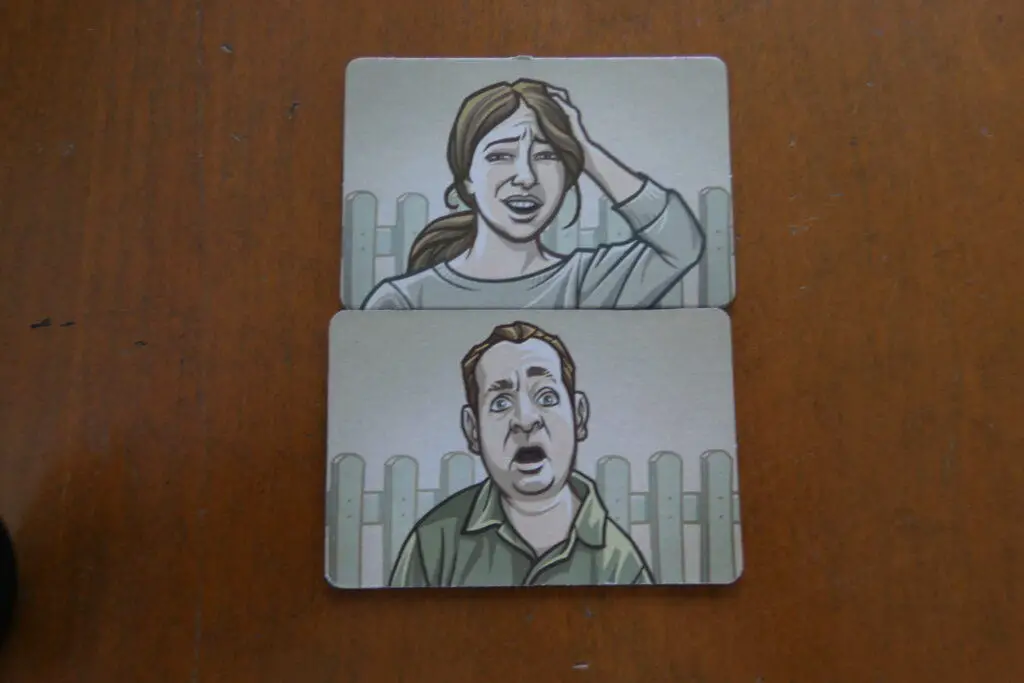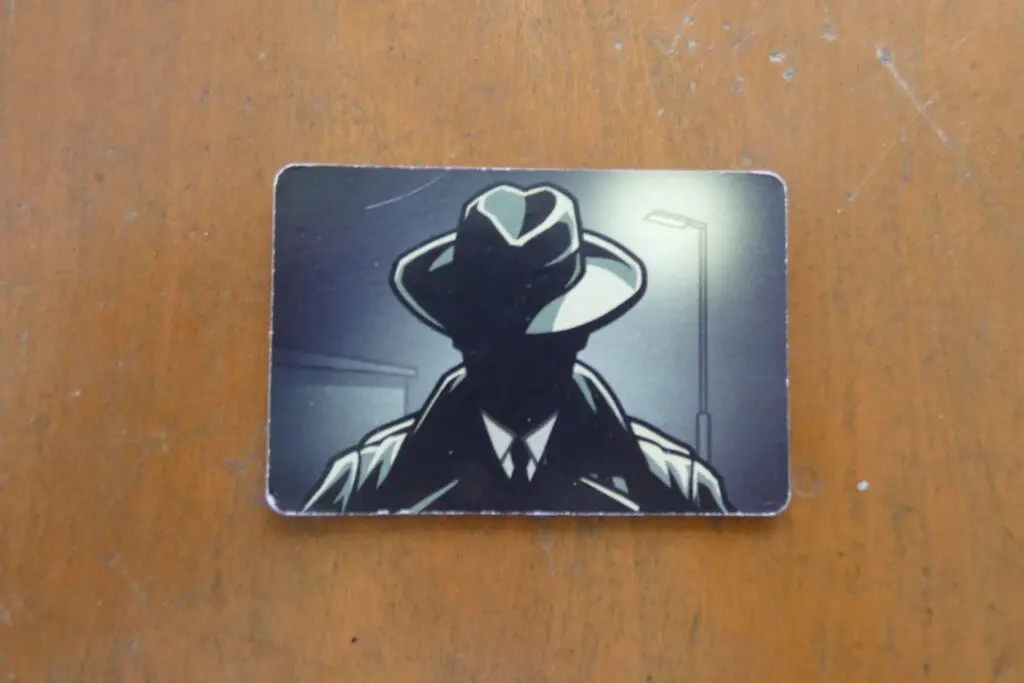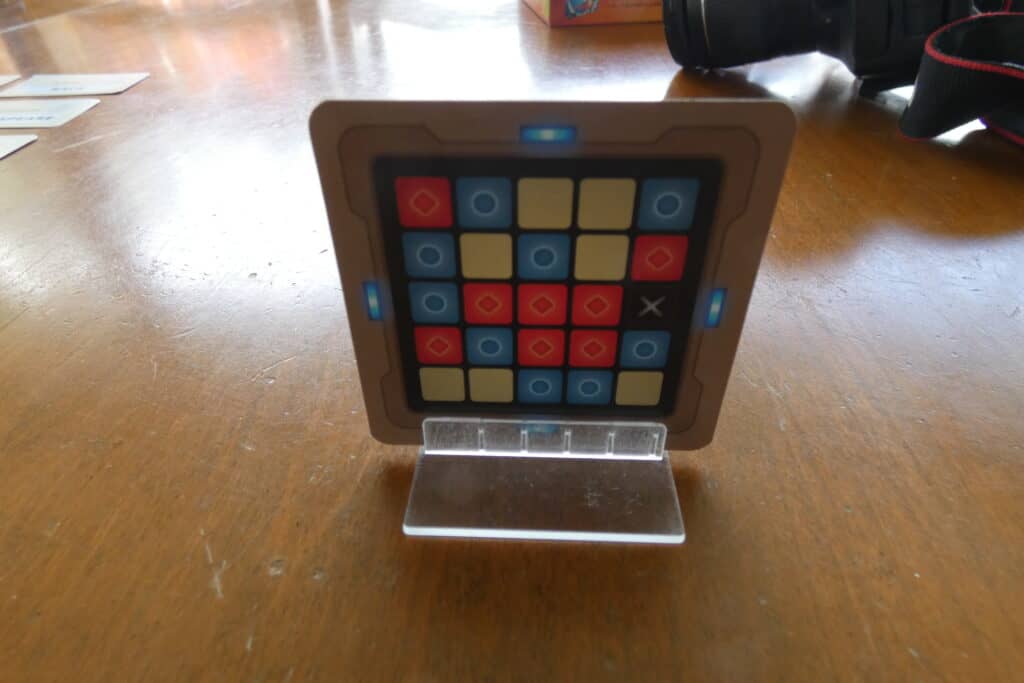This may be my favorite board game at the moment. I’m always secretly hoping that our group game nights include this game. I love the word association and trying to figure out how many words I can include in a one word clue.
To play Codenames, teams use one word clue cards to reveal secret agents in a 5 by 5 grid, identified as a word, bringing them to safety. The first team to collect all their agents while avoiding the assassin wins the game.
Overview
- Ages 6+
- 5 to 10-minute game play
- 2-8 player collaborative game (we’ve played with up to a dozen players)
- Group game
- Party game
- Webcam friendly game (instructions at bottom)
In the box you’ll find the instructions, agent, innocent bystander and assassin cards, puzzle key cards, and word cards.
Agent Cards

Innocent Bystander Cards

Dual Card
Assassin Cards

Puzzle Key Cards

Word Cards

Game Set Up
Divide the players into teams and designate which team is red or blue.
Place 25 words in rows of 5×5 in the center of the table.
Place the Innocent Bystander, Dual card, Assassin and Agent cards to the side of the word square. These will be used as the teams guess words from clues given.
Choose one player from each team to be the spymaster. The spymasters will need to sit close to each other so they can both see the puzzle key card.
Choose a Puzzle Key card. Look at the border color, is it blue or red? Whichever border color is on the card, that team is now “Team A” , and goes first. Place the dual bystander card in Team A’s agent cards turned to their color. Note: the team who goes first will always have one more tile to reveal than the other team.
Spymasters should determine before the game which end is up with the puzzle key card. This ensures that the spymaster doesn’t accidentally give clues for the wrong words.
Game Play
Team A begins by giving a one-word clue that connects some of the words your team is trying to guess. Also, give several words you think the clue is connected to. For example, if three of your words are tree, star, and tinsel, these could be connected to Christmas. So you would say “Christmas-3”. You can give a clue for only one word if you choose. But it’s really fun to try to connect more than one.
Spymasters take turns giving clues. Field operatives must guess at least one codeword.
SPYMASTER
- You get one word!
- Don’t give any other clues, indications, facial expressions, etc. You must keep a straight face at all times.
- Be cautious! Don’t be so focused on only your words that you forget to check the other words. You wouldn’t want to give a clue that will point your field operatives to the other team’s codewords, or worse yet, find the assassin!
- Your Field Operatives will indicate which word they choose by touching that word. Place the agent, bystander or assassin card that matches the key card.
- If your teammates chooses a correct word, but it wasn’t a card you intended to match to your selected word, you should act as if it was a word you meant. Place one of your agent’s cards on the selected word without giving your team any indication that it was not one you intended.
- You may not use any word or a form of it shown on the clue cards. For example, if happy is a clue on the table, you can’t use happily or happiness. However, If it has been covered up by an innocent or agent card, it’s no longer visible and you can use that word.
- If a spymaster gives an invalid clue, such as above, and it is caught by the opposing team, the team who gave the invalid clue loses that turn. Additionally, the opposing team may place an agent card on one of their words before giving their next clue. BUT, if it’s not caught during that round, it’s counted as valid and incurs no penalty.
- You may use letters and numbers as long as they are valid clues. For example, you can use X-1 as a clue for x-ray, or FOUR-2 as a clue for square and score.
- Your clue must be about the meaning of the words. Fast for Fastball is not valid. And you can’t use 3-L to tie lamb, like and lose together.
- The number after the clue can’t be used as a clue. For example, if you say Red-4, it can’t be for the codewords wagon and number.
- English only, please, unless it’s a word your group would normally use in an english sentence.
- No using a compound word if part of it is a clue on the table. If it gets covered up, it’s fair game.
- If a word has multiple pronunciations, you may spell your clue without giving indication of the pronunciation. An example would be T-E-A-R. It could be a clue for both cry and rip.
- You may spell out your clue if your team asks or you’re trying to be clear . Accents or noise can make it challenging to understand. You can always ask your opposing Spymaster to help if you’re not strong at spelling.
- If you’d like to use a word that sounds the same but has multiple spellings, you can spell it. For example, if you want to use DEER for animals, it can be spelled.
- Your clue should represent the codewords you’ve chosen. For example, holiday is ok for stocking, elf and tree, but it wouldn’t be ok for an hour.
- If the opposing Spymaster agrees, the clue is valid. You may talk quietly between yourselves. Don’t let anyone else hear!
Expert Clue: Zero
You can use 0 as the number part of the clue. For example, animals:0, would mean that none of the words are related to animals. There is no limit on the words your field operatives can ask, providing they are correct. They must, however, give at least one clue.
Expert Clue: Unlimited
Occasionally you might have several unguessed words from previous rounds. You can use Animals:unlimited instead. The downside is your team doesn’t know how many words are related to that clue. The upside is your team can ask as many clues as long as they continue to answer correctly.
FIELD OPERATIVES
- Keep your eyes on the codenames and not on the spymaster when guessing words. This will help you avoid non-verbal clues.
- You can debate among yourselves before choosing a word.
- Touching a word indicates your official guess.
- You don’t have to guess the amount of times the Spymaster indicates, but you do have to give at least one guess per round.
- If the word belongs to you, your Spymaster will cover it with an agent card in your color. If you have guesses remaining, you can choose to continue giving guesses or stop.
- If the word belongs to an innocent bystander, your spymaster will cover it with an innocent bystander card. Your turn ends.
- If the word belongs to the other team, your spymaster will cover it with the other team’s agent cards. Your turn ends.
- If the word belongs to the assassin, your spymaster will cover it with the assassin card. The game ends and your team loses.
- Your team is allowed one more guess than your spymaster indicates, that is, if you’ve guessed correctly. For example, if your Spymaster says, Dog-2, and you’ve found the 2 clues the Spymaster intended, you can give one more guess. While not very beneficial at the beginning of the game, it comes in handy when somes cards have been covered and narrows down choices from an earlier unanswered clue.
Optional Timer
While the timer is not a requirement, sometimes players may take too long to make a choice. Any other player can turn the timer over and ask the slow player to make a decision before the sand runs out. Having trouble yourself? You can use the timer on yourself. You can always give a clue for one of your most challenging codewords and regroup while the other team guesses.
Choose Your House Rules
These rules are up to you. Decide before playing which you’ll use during the game. A quick note to spymasters: don’t make up words that while real, aren’t valid. For example, you can’t use Marsha Mellow to describe a NAME and a FOOD. It’s just not cool, dude.
Compound Words
According to Grammerly there are 3 ways to write a compound word.
Closed compounds, joined to form a single word, open compounds, which are spelled as two words such as ice cream, hyphenated words, which are joined by a hyphen long-term.
It’s up to you to allow any form of these. However, players may not invent new words to suit their clues.
(https://www.grammarly.com/blog/open-and-closed-compound-words/)
Proper Names
Use of proper names are considered valid clues. Robert is a valid clue, but specifying Robert Kennedy or Robert E Lee might be useful for your teammates. You can as a group decide beforehand to choose whether to count proper names as one word. This can also apply to titles, such as Batman Begins. Even if you choose not to multi word proper names, you may allow places like Sioux City.
Spymasters shouldn’t be allowed to make up names, not even names that turn out to be real.
Acronyms & Abbreviations
We all know the FBI isn’t really a word, But it can be a great clue. You can choose to allow abbreviations like ATM, USA or RSVP. Also, commonly used words like scuba, bae or laser, while actually acronyms, are always allowed.
Homonyms
While this rule has been addressed in the general rules as not being allowed, you can make it your house rule if you prefer to use a word to be a clue even if it doesn’t actually represent the clues. For example, flower can be used to identify the clue wheat or baking if it makes the game more enjoyable for you.
Rhymes
Rhymes are allowed if they align with the meaning. Consider space race. Not only if they rhyme, but the two words together have a meaning. Space grace wouldn’t be allowed as these two words do not have a connection between them.
If you do decide to allow rhyming as a clue, remember that the Spymaster can’t let anyone know it’s a rhyming clue. Your team will have to figure that one out on their own.
Winning the Game
Play continues between teams until one team has located all of their agents, making them the winner OR the assassin is revealed. In this case, the other team, even if they’ve not found all their agents, win the game.
Just a bit of last-minute fun…
While perusing Youtube, I found an entire channel devoted to board game ambiance music. Check it out!

